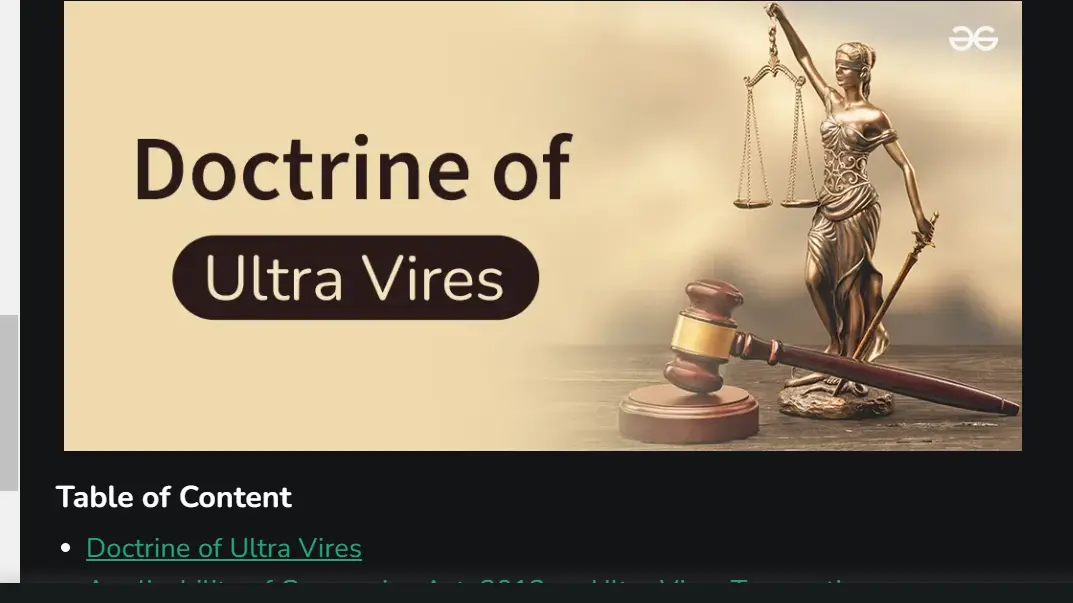
The doctrine of ultra vires is a fundamental concept in both corporate law and constitutional law, pertaining to actions or powers exercised beyond the legal authority granted to an entity or individual. The term ultra vires comes from Latin, meaning “beyond the powers.” The doctrine essentially asserts that any act conducted outside the scope of legal authority is void and has no legal effect.
This doctrine has far-reaching implications for the functioning of both companies and government entities. It is essential in maintaining the rule of law, ensuring that actions and powers are exercised within the limits set by law, and protecting stakeholders from unauthorized actions.
Table of Contents
I. What is the Doctrine of Ultra Vires?
The doctrine of ultra vires establishes that any action taken by a corporate body or public entity that falls outside its legal powers or authority is invalid and unenforceable. This principle upholds the idea that organizations, whether corporations or government bodies, are restricted to acting within the powers granted to them by law or their constitution.
The doctrine of ultra vires applies primarily in the following contexts:
- Corporate Law: When a company performs actions that go beyond the objectives stated in its memorandum of association.
- Constitutional and Administrative Law: When a public authority, like the government or regulatory bodies, acts beyond the powers conferred upon it by law.

P.C. – geeksforgeeks.org
II. Historical Development of the Doctrine
The concept of ultra vires has its roots in English common law. The term was first applied to companies to ensure that they only conducted business within the scope of their stated purpose as defined in their constitution. Over time, the doctrine extended beyond corporate law to influence the broader legal system, particularly constitutional law and administrative law.
- Corporate Law: In the early 19th century, companies were required by law to specify their objectives in the memorandum of association. The doctrine ensured that the company could not exceed the powers described in this document.
- Constitutional Law: The principle was later applied to governmental powers, emphasizing that actions by government authorities beyond the scope of their constitutionally delegated powers were ultra vires and thus void.
III. Application of the Doctrine in Corporate Law
In corporate law, the doctrine of ultra vires is primarily concerned with ensuring that companies do not act beyond their specified purposes. It is applied to prevent companies from engaging in business activities that are not outlined in their foundational documents.
- Memorandum of Association: A company’s memorandum of association outlines the objectives and powers of the company. Any act carried out that is not authorized by this memorandum is considered ultra vires and is typically void.
- Example: If a company incorporated for the purpose of manufacturing electronics enters into a real estate transaction, this could be considered ultra vires.
- Ultra Vires Contracts: If a company enters into a contract that exceeds its powers as outlined in the memorandum, such a contract is void and unenforceable.
- Example: A company entering into a contract to buy land for agricultural purposes when its business purpose is to manufacture textiles is engaging in ultra vires activity.
- Shareholder Protection: Shareholders have the right to challenge ultra vires actions, protecting them from decisions that do not align with the company’s objectives.
- Doctrine and Corporate Governance: The doctrine is essential in maintaining transparency and accountability in corporate governance. Directors and officers of a company are legally bound to act within the powers granted to them.
IV. Application of the Doctrine in Administrative and Constitutional Law
The doctrine of ultra vires also plays a crucial role in public law, where it limits the powers of government authorities, agencies, and local bodies. It ensures that these entities do not act beyond their constitutionally or legally granted powers.
- Legislation: When a law or regulation exceeds the authority granted by the Constitution or relevant statutes, it may be challenged as ultra vires.
- Example: A state legislature passing a law that conflicts with the Constitution can be deemed ultra vires and void.
- Executive Actions: Government actions that go beyond the powers conferred upon the executive branch are ultra vires.
- Example: If a government agency acts beyond the scope of the powers delegated to it, such as imposing fines without legal authority, its actions may be struck down as ultra vires.
- Judicial Review: Courts are often tasked with determining whether actions taken by public authorities are ultra vires. This is an important mechanism in ensuring that no entity, whether private or governmental, exceeds its legal powers.
V. Doctrine of Ultra Vires in Indian Law
In India, the doctrine of ultra vires has been incorporated into legal and constitutional frameworks. It has had significant implications for both corporate law and constitutional law, ensuring that actions by companies and government bodies stay within their legal boundaries.
- Corporate Law: Under the Indian Companies Act, 2013, a company is required to specify its objectives in its memorandum of association. Any act carried out beyond these objectives is ultra vires.
- Section 13 of the Indian Companies Act allows companies to alter their objects clause, but the scope of these alterations remains bound by the doctrine of ultra vires.
- Government and Administrative Law: The Indian judiciary plays an essential role in applying the ultra vires doctrine to actions taken by the government. For instance, if a government agency issues an order or regulation beyond its statutory powers, the courts may deem such actions ultra vires and void.
- Example: In State of Rajasthan v. Union of India, the Supreme Court examined whether the government could exceed its statutory powers, ruling that such actions were ultra vires.
- Judicial Review: The power of judicial review in India ensures that the ultra vires doctrine is upheld. Courts often scrutinize administrative and legislative actions to determine if they are within the powers granted by the Constitution and relevant statutes.
VI. Modern Relevance and Criticisms
The doctrine of ultra vires continues to play a crucial role in contemporary legal systems, though it has faced some criticisms and challenges.
- Criticism: One critique of the ultra vires doctrine is that it may sometimes result in a lack of flexibility in decision-making, especially in a dynamic business environment where companies may wish to adapt to new circumstances. Critics argue that the rigid application of this doctrine stifles innovation.
- Corporate Flexibility: Modern business practices often involve rapid changes and strategic diversification. The strict enforcement of ultra vires may limit companies from pursuing legitimate business ventures that were not initially included in their objectives clause.
- Evolution of the Doctrine: In some jurisdictions, there has been a shift toward a more flexible interpretation of the doctrine, allowing for broader powers to be exercised by corporations as long as they are within the general scope of their objects.
VII. Ultra Vires in the Context of Borrowing and Debt
The doctrine of ultra vires has significant implications for companies and their ability to engage in borrowing and incur debt.
- Ultra Vires Borrowing: If a company borrows money for purposes outside its stated objects, such borrowing may be considered ultra vires and therefore invalid.
- Example: If a company incorporated to engage in retail business takes a loan for real estate development, such a transaction may be void if deemed ultra vires.
- Implications for Creditors: Creditors are generally advised to ensure that they are entering into contracts with companies that have the legal authority to do so. Failure to do so may lead to unenforceable contracts.
- Case Law: The case of Associated General Contractors v. Metropolitan District Commission (1972) highlights the consequences of ultra vires borrowing, where the court held that a contract entered into by a company beyond its powers was void.
VIII. FAQs on the Doctrine of Ultra Vires
- What does ultra vires mean? Ultra vires is a Latin term meaning “beyond the powers.” It refers to actions taken by an individual or entity that are beyond the legal authority granted to them.
- Why is the ultra vires doctrine important? The doctrine ensures that organizations and government bodies act within their legal powers, maintaining accountability and preventing abuse of authority.
- How does the ultra vires doctrine apply in corporate law? In corporate law, the doctrine applies to prevent companies from undertaking activities outside their stated objectives in the memorandum of association.
- Can an ultra vires act be enforced? No, an act that is ultra vires is generally considered void and unenforceable.
- What is the significance of the ultra vires doctrine in government actions? The ultra vires doctrine ensures that governmental actions are within the scope of the powers granted to public authorities by law or the Constitution.
- How does the Indian legal system address ultra vires actions? The Indian legal system applies the ultra vires doctrine through judicial review, ensuring that government actions and corporate activities are in line with the law.
- Can a company alter its objectives to avoid ultra vires? Yes, a company can alter its objectives through the memorandum of association, but such alterations must be within the legal framework and still comply with the ultra vires doctrine.
- What are the consequences of an ultra vires contract in corporate law? An ultra vires contract is void and unenforceable, and the company may face legal challenges from shareholders or other stakeholders.
- How has the ultra vires doctrine evolved over time? The ultra vires doctrine has evolved to balance flexibility with accountability, particularly in modern corporate governance and governmental regulation.
- Are there exceptions to the ultra vires rule? Yes, some jurisdictions have relaxed the rigid application of the ultra vires doctrine, allowing companies greater freedom to act within the general scope of their objectives.
IX. Conclusion
The doctrine of ultra vires is a vital principle in ensuring that entities, both corporate and governmental, act within their legal boundaries. It serves as a safeguard against unauthorized actions and protects stakeholders from unlawful conduct. However, in a rapidly changing world, the doctrine has faced challenges, with calls for greater flexibility in its application. The evolution of the doctrine is ongoing, and it remains an essential tool in maintaining legal and ethical standards.
For more information, you can visit these government resources:
- Ministry of Corporate Affairs: https://www.mca.gov.in/
- Supreme Court of India: https://www.sci.gov.in/
Also Read: A Comprehensive Guide to Federalism and the Federal Features of the Indian Constitution
Also visit: Online Legal Service, Virtual Advice and Consultation



